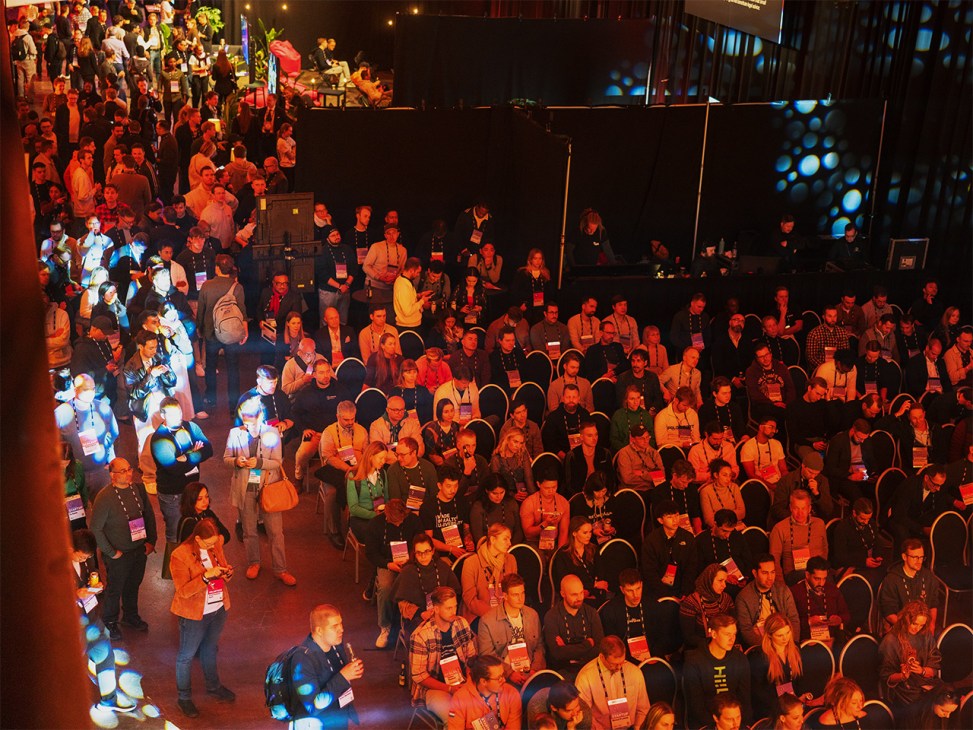Slush is the start-up event that maps the smart money – here’s where investors are betting big for 2026
The annual start-up forum can act as a crystal ball for industry trends and market signals. From AI and biotech to climate solutions, here are the insights from the 2025 instalment.
Helsinki in late November is not an obvious stop on the global tech calendar, yet the 2025 edition of start-up event Slush drew in a mix of 13,000 founders and investors. The delegates, representing more than $4trn (€3.46trn) in assets under management, seemed unfazed by the -10C temperature as deals were struck and parties extended into the late hours. The sums alone say something about Slush’s relevance but the event’s real appeal is its precision matchmaking: a tightly curated environment where capital, conviction and opportunity meet with uncommon clarity (and eye contact).
As Slush CEO Aino Bergius points out, more than 80 per cent of the attendees are either start-ups or investors. “If you come to Slush, the likelihood of meeting the right people is higher than ever,” she tells Monocle. That is what the event sells: high-yield proximity.

For investors, the added appeal is efficiency. Zhenya Loginov, partner at Accel, one of the largest VC firms on the planet, describes Slush as “suitably small” and “well curated”, a contrast to the sprawling, low-signal events that dominate the circuit elsewhere. Loginov moved from California to Europe because “opportunity is here”, and views Slush as the clearest snapshot of where value is emerging and which founders are worth backing.
The dominant theme this year came as no surprise: artificial intelligence cropped up on almost every pitch deck and in myriad conversations. Beneath the hype, investor attention is maturing as behaviour becomes more disciplined and focuses on the offerings that are truly commercially ready. Loginov points to specific applications – developer tools and customer support – as already maturing, while warning that the rush to build ever-newer AI models might turn out to be an overfunded area in the long run. The attraction is obvious but the path to monetisation remains unclear.
A quieter but significant shift at Slush is the renewed focus on deep tech. Founders working in med-tech, space, quantum, advanced materials and energy systems say investor attitudes have changed markedly; timelines once dismissed as “too slow” are now viewed as essential to solving the world’s most expensive problems. “Scientific innovations have been around long enough that investors finally believe in them,” says Richard Jerome, a founder and science-commercialisation specialist. He cites the strong presence of European public funding as another reason that the sector is gaining momentum.

This reassessment is visible in companies such as Robeauté. Co-founder Joana Cartocci is building microrobots for neurosurgery – tiny devices that move through the brain more delicately than conventional surgical tools. The company has raised €27m this year and is preparing for human studies. She sees investors shifting focus from quick returns to “the hard stuff”, and notes that portfolios are filling up with companies keen to fix society’s big problems. It marks a more ambitious mindset, one that aligns with Europe’s desire to reclaim a more assertive role in global innovation.
Beyond funding rounds, Slush acts as a calibration tool for anyone assessing where the smart money is moving. Jerome, an Insead MBA graduate who moved to Helsinki and launched a start-up here, notes that the event teaches first-time founders how to approach investors and which ones are worth their time.
Maija Itkonen, co-founder of Onego Bio, a Finnish biotech company producing animal-free egg proteins, says Slush remains uniquely valuable because it forces deep-tech companies out of the lab and into the market conversation. Investors, she notes, now better understand the slower logic of deep tech, capital is moving again, and they are asking for hard numbers, genuine unit economics and verifiable traction. The era of speculative storytelling is fading.
For those trying to interpret where the smart money is going, Slush offers a clear if fast-moving picture.
- AI remains the dominant force but is splitting into the investable and the hopeful.
- Deep tech is sliding back into favour, supported by geopolitics, patient capital and a recognition that Europe must build its own industrial base.
- Climate-related technologies are shifting from moral argument to economic logic.
- Defence tech, despite significant funding, remained curiously absent from the keynotes and PR pitches.
Across the board, investors now place a premium on founders tackling real-world problems rather than producing small optimisations. As Bergius said in her opening remarks: “The big question is no longer what technology can do – it’s what it should do.”



